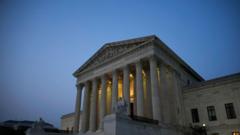As the Supreme Court considers arguments on Trump's attempt to end birthright citizenship, tensions rise over executive authority and constitutional interpretation, with implications for thousands of children born in the U.S.
Supreme Court Deliberates Trump's Challenge to Birthright Citizenship

Supreme Court Deliberates Trump's Challenge to Birthright Citizenship
The U.S. Supreme Court hears pivotal arguments around President Trump's controversial order to eliminate birthright citizenship, spotlighting the power dynamics between the presidency and the judiciary.
In a significant legal battle, the U.S. Supreme Court heard arguments on Thursday regarding President Donald Trump's contentious order to eliminate birthright citizenship, a move that raises critical implications for immigration policy and constitutional rights. The case questions whether lower courts possess the authority to challenge presidential directives on a nationwide scale—an issue highlighted by the administration's assertion that these judicial checks restrict executive powers.
During the two-hour session, lawyers representing both sides presented their arguments to the justices. The U.S. solicitor general contended that lower courts are overreaching their jurisdiction when attempting to block presidential orders, arguing that this limits executive capability. Conversely, representatives from states opposing the order cautioned against creating a fragmented citizenship system that could lead to disparities in rights and benefits based on geographic location.
Key justices appeared divided, weighing the implications of granting the presidency broader power against maintaining judicial oversight of executive actions. Justice Elena Kagan questioned the rationale behind the administration bringing this case to the Supreme Court after losing consistently in lower courts, while Justice Samuel Alito raised concerns about the predominance of judicial power in issuing nationwide rulings.
Outside the courthouse, crowds gathered in protest, accompanied by prominent political figures like former House Speaker Nancy Pelosi, who emphasized the traditional American values tied to citizenship and due process. The stakes of the case extend beyond legal interpretations, with potential repercussions for tens of thousands of American children, particularly those born to undocumented parents, who may face uncertain futures if birthright citizenship is overturned.
Trump's argument hinges on a particular interpretation of the 14th Amendment, claiming that citizenship should not automatically extend to children of non-citizens or temporary residents. However, critics argue that such a move would violate long-standing legal precedent and undermine the foundational rights granted to individuals born in the U.S.
The Supreme Court's ruling, which remains uncertain, could redefine the landscape of immigration and citizenship in America, fundamentally altering the birthright citizenship principle established since the 19th century. Whether the ruling aligns with Trump's vision for his policy agenda or preserves the status quo will undoubtedly influence future legal battles as the administration navigates its contentious relationship with the judiciary.























